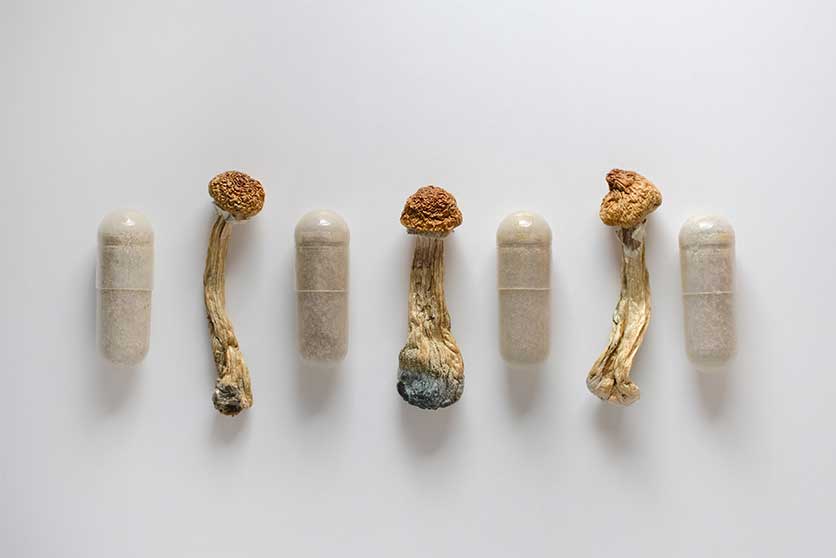Psychedelic drugs are psychoactive substances that alter your mood, thoughts, and perceptions. Studies suggest that they may help treat mental health concerns like anxiety, depression, and trauma.
Due to these mental health benefits, some people have started using psychedelics to become better parents. This practice is known as psychedelic parenting. Here’s what you should know about it.
What Is Psychedelic Parenting?
The term psychedelic parenting describes the use of psychedelics to manage the stress of modern parenting. It’s also sometimes called “plant parenthood.” In recent years, many people interested in this practice have connected through online and in-person support groups.
There are many different psychedelic substances, including LSD, ketamine, ayahuasca, MDMA, and DMT. However, psychedelic parenting typically involves psilocybin mushrooms (also known as “psychedelic mushrooms,” “magic mushrooms,” or “shrooms”).
Microdosing Psilocybin
At normal doses, psilocybin mushrooms can cause an altered state of consciousness, also known as a psychedelic experience or trip. In general, though, psychedelic parenting does not involve normal doses of psilocybin.
Instead, moms and dads microdose, which means they use extremely small amounts of the drug.
This practice can impact the way you think and feel without causing a full-on trip. In other words, most psychedelic parents don’t report hallucinations or other intense symptoms that could prevent them from completing daily tasks.
Alleged Benefits Of Psychedelic Parenting
People who engage in psychedelic parenting report benefits such as:
- reduced stress
- better mood
- improved concentration
- heightened creativity
Some parents also claim that psilocybin helps them manage their problems more effectively.
Improved Mental Health
Others say the drug improves symptoms of depression and anxiety by disrupting negative thought patterns. Many of these individuals turned to psychedelics at the height of the COVID-19 pandemic, when mental health concerns soared.
Since then, some have stopped using their antidepressants and anti-anxiety medications in favor of psilocybin.
Finally, some parents say psilocybin has helped them cope with childhood trauma. As a result, they find it easier to connect with their own children.
Risks Of Psychedelic Parenting
Psychedelic research has not yet determined whether microdosing psilocybin or other psychedelics is safe.
In general, clinical trials suggest that psilocybin might be safe at low doses for some people. However, the drug may have negative effects in other people, including those with major mental health conditions such as bipolar disorder and schizophrenia.
Tolerance, Large Doses, & Bad Trips
People who regularly microdose may develop a tolerance to psilocybin. That means their bodies become used to the effects of the drug over time. They will then need increasingly larger doses to feel the desired effects.
At high doses, psilocybin can cause uncomfortable symptoms such as:
- intense anxiety and panic
- mood swings
- distorted sense of time and reality
- paranoia (irrational distrust of others)
- delusions (beliefs that conflict with reality)
- hallucinations (seeing, hearing, or feeling things that aren’t there)
- headache
- drowsiness
- nausea and vomiting
- increased heart rate, blood pressure, and body temperature
- impaired coordination
Some people also develop personality changes that last long after the drug wears off. Others experience unpleasant flashbacks of bad trips. These flashbacks may last for months or even years.
Health Risks
Even if you only use small doses, psilocybin might not be safe.
Psychedelic mushrooms resemble certain poisonous mushrooms, which means psilocybin users face a poisoning risk. Mushroom poisoning may lead to severe illness, organ damage, and, in some cases, death.
Contamination
In addition, psilocybin mushrooms sold on the street may be contaminated with stronger psychedelics, such as LSD or PCP. These drugs pose additional risks, including aggression and memory problems.
Do Psychedelics Have Health Benefits?
Ultimately, psychedelics may have health benefits when administered by a healthcare professional.
For example, in a 2020 study, 71% of participants given psilocybin for major depressive disorder experienced a symptom reduction of over 50%. More than half of the participants entered full remission.
However, using psilocybin or other psychedelics without medical supervision comes with risks. Before trying these drugs, talk to your doctor. They can help you determine whether psychedelic parenting is right for you.
Also, remember that psychedelics are still illegal under federal law, though some states have legalized or decriminalized them.
If you or someone you love struggles with drug use, please reach out to Northeast Addictions Treatment Center. Our board-certified healthcare providers offer behavioral therapy, medication-assisted treatment, and other evidence-based treatments.
Sources
Drug Enforcement Administration — Drug Fact Sheet: Psilocybin
Harvard Health Publishing — The popularity of microdosing of psychedelics: What does the science say?
JAMA Psychiatry — Effects of Psilocybin-Assisted Therapy on Major Depressive Disorder
Molecules — The Therapeutic Potential of Psilocybin
NPR — Thousands of moms are microdosing with mushrooms to ease the stress of parenting



